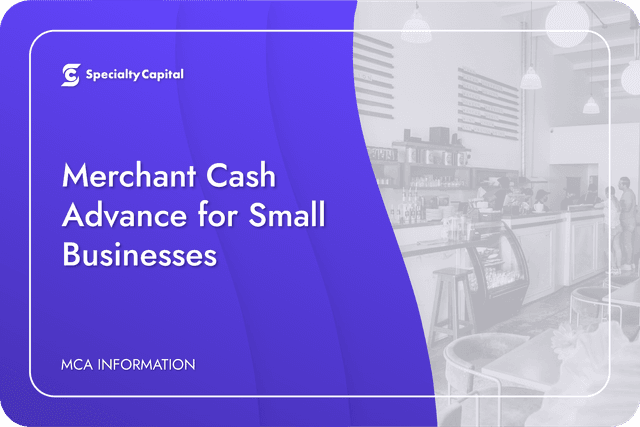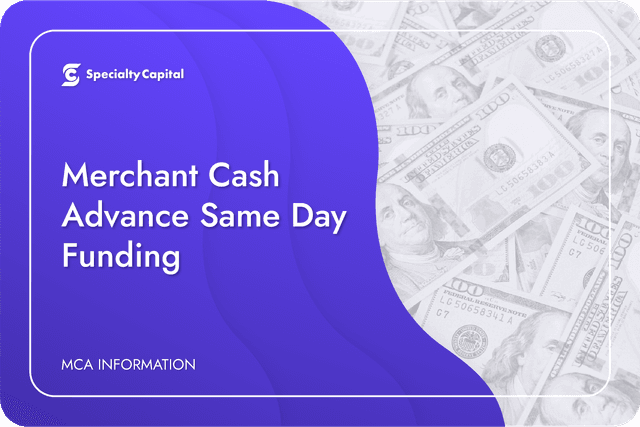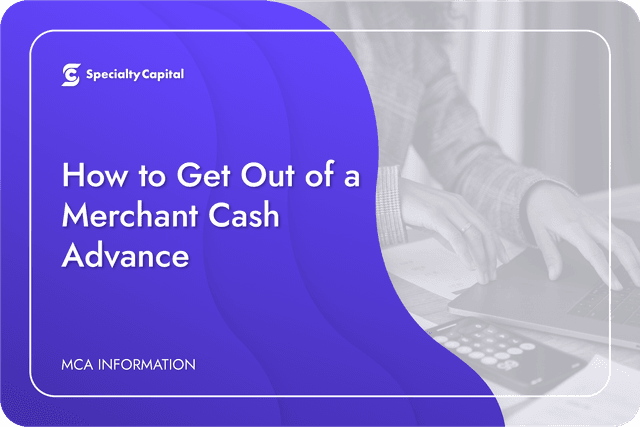A merchant cash advance (MCA) can be great when you need short-term financing that’s easy to secure, but what happens if you want to get out of an MCA once you have it?
In this article, we’ll discuss six ways of getting out of an MCA, as well as the consequences of defaulting.
The simplest way of getting out of a merchant cash advance is paying back the amount you owe. But simplest doesn’t necessarily mean easiest. For example, if you’ve spent all the money from your MCA, and now you’re relying on your business’ revenue to make repayments, keeping up with your MCA obligations may be tough.
Granted, you won’t have to pay traditional fees each month on your remaining MCA balance, but the factor rate you get could make borrowing the money extremely expensive. MCA factor rates can be anywhere from 1.1-1.5 depending on your business’ creditworthiness and financials.
This is why it’s critically important to assess your ability to remit before taking on an MCA. Even borrowing $50,000, which is a relatively small amount as far as traditional financing is concerned, could have you paying anywhere from $5,000 to $20,000 on top of the funded amount.
And while traditional financing fees aren’t part of the original agreement, it’ll get added to any past-due repayments. This is why, at the very least, you should keep up with MCA remittance. Even missing one could raise the total cost of borrowing and elongate the time it takes to fully pay off the MCA.
Lastly, if you have enough to fulfill your remaining MCA balance, but you’ve only had the funding for a few weeks, you may get hit with a prepayment penalty. Some MCA funders like Specialty Capital don’t penalize borrowers for paying back the full amount early, but many charge a small fee of the total funded amount as a fee.
Renegotiating with your funder may reduce how much you have to remit or give you more time to fulfill your obligation. But MCA funders aren’t required to renegotiate after the original agreement is reached, so keep this in mind before applying for an MCA.
Most borrowers who are looking to renegotiate the remittance of an MCA want to pay back less than what they owe, but most funders aren’t willing to accept less than the amount that was originally agreed on. That said, if your funder determines that reducing how much you owe is likely to secure a profit, albeit smaller than what was originally expected, they may cut you a break.
In most cases, however, a funder will give the borrower more time to remit on the amount. For example, if your original remittance schedule was once every week, they may accept bi-weekly remittance or even monthly remittance. This won’t reduce how much you have to pay back but it will give you more time to come up with money for repayments.
Just remember that your funder may view a default as more favorable than renegotiating. This is especially true if you had to sign a personal guarantee to secure the MCA. Therefore, you should never take out an MCA with an expectation that you’ll be able to renegotiate the agreement at a later date.
A certified public accountant (CPA) won’t help you negotiate with your funder, but they can help you manage your books so you’re in a better position to consistently make remittance on time.
They can help you cut costs and avoid wasteful spending, and the money you save from their assistance can be put towards remitting the MCA.
Additionally, they can help you prepare important financial documents, like balance sheets and profit-and-loss statements, which you’ll need if you get a chance to renegotiate with your funder. They’ll ensure required documents are detailed, accurate, and neat so you can put your best forward during negotiations.
Of course, their services won’t come cheap, so you may not be able to enlist their help if your business is strapped for cash. But if you can find the money to hire an experienced CPA with a proven track record, your chances of being able to fulfill the MCA in a reasonable amount of time, and without incurring penalties, go up significantly.
Taking on more debt to pay off existing debt is an option you should think long and hard about before you pull the trigger. That said, in the case of taking out term financing to pay off a costly MCA, things could work out well for your business if you’re able to secure reasonable agreement terms.
This option is especially worth considering if you’ve already paid a lot of the MCA off. Why? Because your loan will be smaller, meaning you won’t pay a ton in fees on top of it. However, if you haven’t made much of a dent in the MCA, using term financing to fulfill the remaining balance could have you paying a lot more in the long run.
Generally, the cost of an MCA is fixed, so long as you consistently make repayments on time. But if you take out term financing to fulfill the balance, you’ll be paying monthly fees until it’s paid back.
It should be pointed out that getting approved for business term financing, whether it’s secured or unsecured, is hard if you’re looking to use the funds to pay off an existing debt. The SBA, for example, prohibits using their 7(a) and 504 loans for debt consolidation, and private funders tend to see this practice as a glaring red flag, so keep that in mind.
Unlike a CPA, a lawyer that specializes in MCA negotiations can help you reach a deal with your funder. But there’s no guarantee the funder will be willing to negotiate, even if you have a lawyer on your side. MCA funders usually have airtight lending agreements, so there may not be a lot of wiggle room as far as your obligations are concerned.
But if your funder is willing to negotiate, having a lawyer working on your behalf could be a game-changer. For one, they’ll know if any local or federal lending laws apply to your situation, and they may be able to leverage certain statutes and/or regulations to secure a favorable deal.
Additionally, if your funder takes you to court because you’re unable to meet your obligations, they can represent you. Plus, since it’s not their debt, they won’t be hindered by emotions when negotiating.
However, getting assistance from a lawyer will cost you. And since MCA attorneys often charge by the hour, their help can be quite expensive, especially if negotiations are drawn out.
In the end, you’ll have to weigh the prospect of getting your debt reduced with the cost of hiring a skilled and experienced attorney. If legal assistance is going to make your business’ financial situation even more precarious, negotiating on your own or simply paying off what you owe may be better options.
Filing for bankruptcy should be your last resort when you want to get out of an MCA, as doing so will destroy your credit and make it harder to borrow again. However, filing for bankruptcy does have its advantages.
For example, filing for bankruptcy can yield an “automatic stay” that prevents creditors from being able to collect money from you while bankruptcy proceedings are underway. Also, the assets you don’t fully own, like a home or vehicle, won’t be subject to foreclosure or repossession.
If your debt is discharged at the end of the process, creditors will no longer be able to collect money from you. Additionally, the money you earn after the process is complete can’t be garnished.
Of course, filing for bankruptcy doesn’t mean you’ll get off scot-free. You’ll probably have to sell some non-essential assets to pay off a portion of your debts, and your creditworthiness will be severely impacted.
Also, filing for bankruptcy can be expensive, costing anywhere from $300 to $3,000 depending on the kind of bankruptcy you declare. And if it’s a complex process, expect the total cost to be on the higher side, as you’ll need an attorney’s assistance.
In short, you should only go the bankruptcy route if you’re fully aware of the consequences. Yes, you may avoid paying back most of your MCA, but securing financing later on will be challenging and you may be prohibited from doing so for 2-4 years.
If you default on a merchant cash advance, you’ll have to pay additional fees, including late-payment fees and collection fees. Additionally, if the funder sues you to collect the debt, you might have to pay their court fees.
This is one reason why renegotiating with your funder before you have to default is recommended. Unfortunately, many funders won’t consider renegotiating until you default.
Defaulting on an MCA will be a major black mark on your credit report that lasts for seven years. Additionally, a default could sink your credit score by 100-150 points.
For these reasons, you should do everything in your power to avoid defaulting. After all, most businesses need financing from time to time, and defaulting will make it significantly harder for you to secure financing in the future.
Why? Because funders will see a default on your credit report and view it as a huge risk. Defaulting essentially means you can’t pay back what you owe, and in this case it’s a lose-lose for you and the funder. Yes, an MCA funder will have a right to seize and sell your personal assets to recoup their losses, but even this may not fully recover what they’re owed.
In most cases, you won’t need to put up collateral to secure an MCA, but you’ll probably need to sign a personal guarantee, wherein you agree that the funder has the right to seize and sell your personal assets if you can’t pay back your MCA. But while a personal guarantee is a legal document, your funder will need a court order to enforce it.
The worst case for most borrowers is a funder seizing and selling their personal home to pay off the debt, but your funder may not go this route right away. For example, if you have non-essential luxury assets, these will probably be sold off first.
Your funder may file a Uniform Commercial Code Lien if you default on the MCA, or they may bring a Breach of Contract and Unjust Enrichment lawsuit against you.
A UCC Lien is essentially a court order which instructs third-party entities, including banks and clients that owe your business money, to channel held and owed funds to the funder.
Sometimes a UCC Lien is filed just to freeze funds, but in most cases a funder will hire a marshal to collect what they’re owed.
In either case, getting assistance from a lawyer who specializes in MCA cases is recommended.
You have several options when you want to get out of a merchant cash advance, including renegotiating, taking out traditional term finance to pay off what you owe, or filing for bankruptcy.
Of course, fulfilling the MCA by making timely remittance is the simplest way of getting out of one. But if this isn’t feasible, consider getting help from a CPA or an MCA attorney.

Merchant Cash Advance for Small Businesses (Benefits & Requirements)
When small businesses need financing, they have a range of financing options to choose from. But many opt for a merchant cash advance (MCA) because...

Merchant Cash Advance Same Day Funding
A merchant cash advance (MCA) is a great financing option when you need same-day funding, but there are certain requirements, restrictions, and dra...

How to Get out of a Merchant Cash Advance
A merchant cash advance (MCA) can be great when you need short-term financing that’s easy to secure, but what happens if you want to get out of an ...